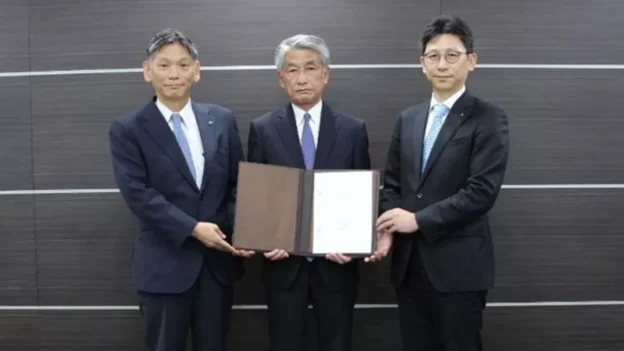Ltd., a subsidiary of the Mitsubishi Heavy Industries (MHI) group, has been awarded orders for the construction of the first Methanol RORO vessels in Japan by Toyofuji Shipping Co., Ltd. (Aichi Prefecture) and Fukuju Shipping Co., Ltd.
Construction of the two ships will be carried out at the Enoura plant of MHI’s Shimonoseki Shipyard and Machinery, located in Yamaguchi Prefecture. The ships are expected to be completed and delivered by the end of fiscal year 2027.
Characteristics of RORO Methanol Vessels
The vessels will have an overall length of approximately 169.9 meters and a beam of 30.2 meters, with a gross tonnage of 15,750 tons and the capacity to transport approximately 2,300 passenger vehicles.
To improve fuel efficiency, a windshield will be incorporated in the bow and a vertical stern, which will help reduce propulsive drag.
In addition, MHI’s patented energy-saving system technology, which combines high-efficiency propellers and high-performance rudders with reduced drag, will be employed. The main engine will be a high-performance dual-fuel engine that will be able to use both methanol and heavy fuel oil A, reducing CO₂ emissions by more than 10% compared to similar ships powered solely by fuel oil.
Benefits of RORO vessels for Japan
Going forward, the use of green methanol could lead to a further reduction of CO₂ emissions, considering the entire fuel life cycle. Although the RORO methanol-powered vessels already operate on ocean routes worldwide, this will be the first time they will be built for coastal service in Japan.
The new vessels will also offer a significant increase in vehicle loading capacity and carrying capacity per voyage compared to conventional vessels. This will provide greater flexibility in vessel assignment schedules, ensuring more rest and vacation time for the crew, thus contributing to work style reforms.
Aiming to address the growing needs of modal shift in shipping in the context of CO₂ reduction, labor shortages and work style reforms, Mitsubishi Shipbuilding will continue to collaborate with its business partners. . The company will continue to provide solutions to various social problems by building ferries and RORO vessels that offer excellent fuel efficiency and environmental performance, ensuring stable navigation for its customers.
Follow us on social networks and don’t miss any of our publications!
YouTube LinkedIn Facebook Instagram X
Source and photo: mhi

